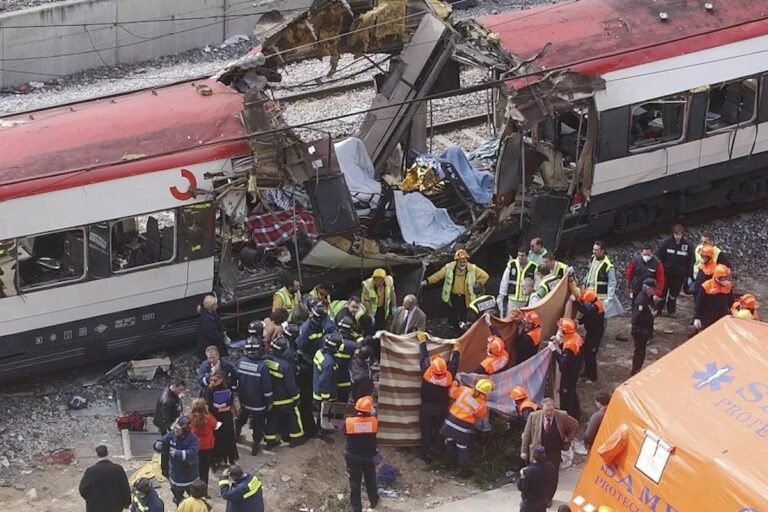[ad_1]
This month, the EU commemorated the 20th anniversary of the terrorist attack on a commuter train in Madrid, Spain. The bombing killed more than 190 people and injured around 2,000, making it the second deadliest terrorist act in Europe, after the 1988 Boeing 747 explosion over Lockerbie.
As a show of solidarity and resilience against violent extremism, the EU has designated March 11 as the European Day of Remembrance for Victims of Terrorism.
The 2004 Madrid train bombing revealed that Europe is not immune to jihadist terrorism. According to the investigation, the attack was orchestrated by a domestic Islamic extremist group enraged by the Spanish government’s support for the Iraq war.
The perpetrators placed bags containing explosives on four commuter trains and detonated them during peak rush hour on the morning of March 11th.
After the collapse of the ISIS caliphate in 2019 and a significant drop in attacks, public concerns shifted to other pressing issues such as the coronavirus. Some analysts therefore started talking about so-called “terrorism fatigue,” but over time those sentiments proved to be misleading.
War breaks out again, and terrorist activities surge again. In early March, Italian police arrested three people who were planning a terrorist attack. The suspects founded an organization associated with the Al-Aqsa Martyrs Brigades, a network of military organizations associated with Palestinian President Mahmoud Abbas’ Fatah movement.
In December, Hamas members were arrested in Denmark, Germany and the Netherlands amid suspicions of planned attacks on Jewish targets in Europe.
Meanwhile, Bojan Vuic, Bosnia and Herzegovina’s (BiH) ambassador to the United Nations, recently acknowledged that the influx of foreign jihadists is a “serious terrorist threat posed by BiH.” He cited reports from Italian intelligence suggesting that about two dozen jihadist groups are currently operating in his country.
Before the 9/11 attacks, which were a watershed moment in the United States, there were significant differences in counterterrorism strategies among Western European countries.
Some countries, primarily France, Germany, and the United Kingdom, have faced terrorist violence in the past, although it has generally not been perpetrated by jihadists. Their governments had well-developed counterterrorism policies in place long before the global war on terror began.
Among them, France was most concerned with the threat posed by al-Qaeda jihadists. By then, the country had already dealt with numerous attacks by Islamic extremists in the 1990s. This is primarily about the Armed Islamic Group (GIA), a rebel group that has fought the Algerian government and carried out several terrorist attacks in France.
According to the Global Terrorism Index, Germany, France and the United Kingdom remain the most terrorism-affected countries in Europe today. Hungary, Bulgaria and the Czech Republic are among the least affected countries in the region. In general, Eastern and Central European countries are largely unfamiliar with terrorism due to the lack of domestic sources for the development of terrorism.
“Islamic extremists have never had a comfortable or adequate base of operations here. Only a small number of Muslims live in this region and the V4 countries. [the Czech Republic, Hungary, Poland, and Slovakia] “They have long refused to accept migrants from the Middle East,” said Jaroslav Kuchina, a senior researcher at the Center for Transatlantic Relations in Prague.
“The consensus of Central European politicians across the ideological spectrum against illegal immigration from Islamic countries continues here. The only country with a large Muslim community is Austria, and The security risks are much more pronounced than in other parts of the region,” he told the authors.
Oldrich Bres, director of the Center for Security Studies at Prague Metropolitan University, said the Czech Republic has little direct experience with terrorism. He also pointed out that there are small numbers of Czech foreign fighters in Islamist groups in Syria and Iraq.
“However, this also meant that counter-terrorism was not really a top priority, and much of the existing legal and institutional framework was a result of membership in the European Union, and EU-level measures “Agency needs to implement and cooperate with EU level.” Even the legal definition of terrorism is an almost verbatim copy/translation from his 2002 EU law,” the expert told the author.
In the aftermath of 9/11, many European countries strengthened the capabilities of their intelligence agencies and partnered with the United States on counterterrorism missions overseas. However, insufficient coordination and cooperation among European countries remained a problem.
As a new phenomenon, al-Qaeda-style threats have required governments to work more closely together, both bilaterally and within the EU. A major step forward was therefore the adoption of the Council Framework Decision of 13 June 2002 on the fight against terrorism. This document was designed to help Member States strengthen cooperation in the field of counter-terrorism, including the fight against terrorist financing.
In 2019, the European Judicial Counter-Terrorism Registry was launched. This useful operational tool allows European law enforcement agencies to identify linkages between current and past individuals, terrorist networks, and investigations.
Another notable improvement was in the area of early detection and prevention of extremist crime. So far, this approach has played an important role in the fight against domestic terrorism.
An EU Steering Committee on Radicalization was established to prevent the spread of extremist propaganda online and develop countermeasures, among other measures. At the national level, legislators across Europe have made changes to counterterrorism policies to focus on prevention.
While strengthening its counter-terrorism capabilities, the European Union is also keeping a close eye on respecting human rights and democratic values. This issue concerns not only the rights of terrorist suspects, but also the freedom of innocent people.
In 2018, the EU ratified the Council of Europe Convention on the Prevention of Terrorism, which aims to support the fight against terrorism. Apart from improving counter-terrorism policies in the region, this document also ensures that all corresponding practices and laws respect human rights and freedoms.
[ad_2]
Source link


